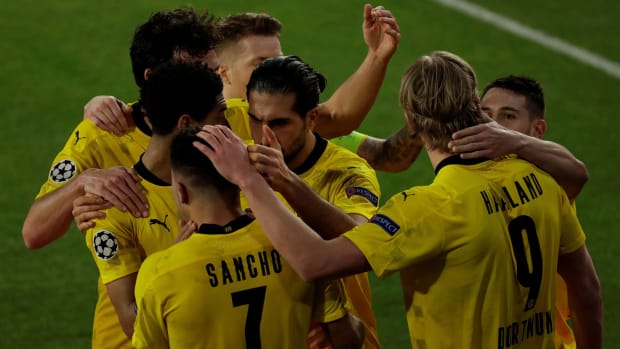Despite a UCL win at Sevilla, Dortmund has work to do to not only stay in this season's competition, but ensure it has a place in next season's, too.
The last few months have been difficult for Borussia Dortmund, but the return of the Champions League has perhaps come as a relief. With two goals from Erling Haaland, and much-improved performance all around, perhaps some confidence has been restored. A 3-2 win at Sevilla in the first leg of the last 16 was just what Dortmund needs–although nobody at the club will be unaware that Europe is not the real challenge at the moment.
Nobody expects Dortmund to win the Champions League, and given the form in which Sevilla and Dortmund entered the knockout stage, expecting progression to the quarterfinals may have been a stretch, too. Wednesday's was a game away from the intense pressure of the Bundesliga, though, where it’s all started to become highly charged. A run of just one win in the last six games has left Dortmund six points off fourth place, and a failure to qualify for next season’s Champions League would be a severe financial blow.
Since the debt crisis of almost two decades ago, Dortmund had been seen as a model of sensible governance, an example of what could be achieved by a club without quite the financial might to challenge the elite. Dortmund may be the second wealthiest club in Germany by revenue, but the latest Deloitte report shows its income is around 75% less than that of Bayern Munich. That’s why the likes of Robert Lewandowski, Mario Gotze and Mats Hummels kept leaving Dortmund for Bayern.
But under Jurgen Klopp and, to a lesser extent, Thomas Tuchel, Dortmund was able to manage that. Klopp won two league titles and took the club to a Champions League final before the departures began in earnest, but Dortmund was regularly the closest challenger to Bayern even after that.
Since Tuchel left in 2017, though, the appointments have been rather less effective and more frequent. Peter Bosz and Peter Stoger did roughly half a season each. Lucien Favre managed 18 months, but by the time he was sacked in December, there was a clear sense his technocratic approach was not the right fit for a club where Klopp brought heavy metal football into the mainstream.
Favre was replaced by his assistant, Edin Terzic, who was only ever, realistically, an interim appointment. Four wins and four defeats amid his first nine games ensured he would not get the job long-term, and earlier this week Borussia Monchengladbach coach Marco Rose, formerly of Red Bull Salzburg, was confirmed as manager for next season.

Terzic still has a vital task in his lame-duck days, though: Dortmund needs Champions League football next season. Despite trimming the wage bill, Dortmund reported losses of over $30 million in the first half of the financial year. Against that backdrop, no Champions League football would make a major sale essential, but transfer fees next summer will not be at the same level they have been for the word's premier young stars. Jadon Sancho, for instance, may have fetched $140 million last year, but a combination of his dip in form plus the depressed market means his price will be nowhere near that now. But if there is no Champions League football, there is far less incentive for the raft of talented young players on whom Dortmund has based its philosophy to stay. Sancho, Haaland, Gio Reyna and Jude Bellingham would not be short of suitors.
What must be frustrating for the Dortmund hierarchy is the sense that there is nothing fundamentally wrong with this side. It has played well in patches all season, lost games freakishly and suffered from the inconsistency of goalkeeper Roman Burki. Perhaps that is simply what happens when a team is so packed with youth–it cannot be relied upon. On the other hand, it can produce performances like the one Dortmund did on Wednesday.
Sevilla entered having lost one of its last 19 games. It had won nine in a row and kept seven successive clean sheets. When Suso’s shot deflected past goalkeeper Marwin Hitz after seven minutes, the course of the game seemed set. But then Mahmoud Dahoud, who has been out of favor of late, lashed in an equalizer from 25 yards, Haaland took over and the whole tone of the game changed.
If Haaland gets a run at a defense, he is as good as unstoppable. His first goal was a classic of his oeuvre, charging forward, playing the ball to Sancho and running in to volley in the return pass.
His second was a crisp finish from Marco Reus’s pass after Sevilla had been caught in possession. A proud defensive record was shattered in the face of the marauding Norwegian.
But with Dortmund this season, nothing is ever easy. Sevilla controlled possession but was oddly diffident until Luuk De Jong stole in off a free kick to cut the deficit with six minutes remaining. That, perhaps, keeps Sevilla’s hopes of a comeback alive and puts Dortmund in a familiar spot. Despite a good night filled with promise from its burgeoning stars, there's a looming vulnerability–and chance for a major disappointment.